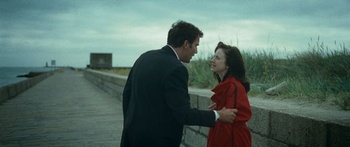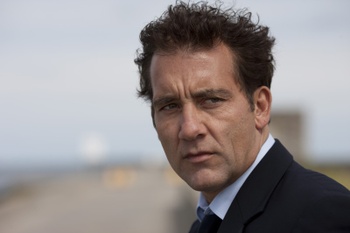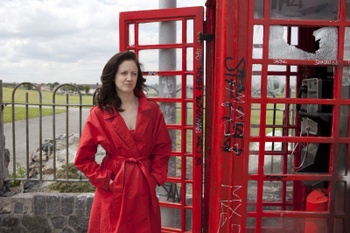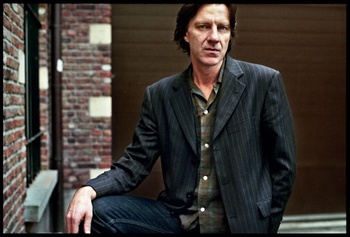Incredible documentaries (Man on Wire, Project Nim), superior TV drama (Red Riding), and powerful films (The King): you never know where James Marsh is going to pop up, but his work is always worth seeing. “You recognise a good story when you come across it.”
A few months ago James Marsh turned up in Ghent. The English director, who won an Oscar for his penetrating documentary about a daredevil who walked a tightrope he had secretly strung between New York’s Twin Towers, was there to present Shadow Dancer at the Ghent Film Festival. In the film, Clive Owen and Andrea Riseborough (remember that name) play an MI5 agent and a young Belfast mother who, like her brothers, carries out attacks for the IRA (Irish Republican Army). After a failed attack she is forced by him to spy for MI5. Marsh slowly but surely builds up the suspense.
The dreary atmosphere of Belfast in the early 1990s as it desperately yearns for peace is movingly sketched. Emotions flare up without a single actor being guilty of overacting. There are thrillers that have to settle for less.
Does Shadow Dancer show how deeply the Northern Ireland conflict had intruded into everyday life?
James Marsh: One of the elements that attracted me to the screenplay was the unusual setting for espionage: an ordinary Belfast living room. We have all, at some time or other, eavesdropped on our parents – I did, anyway – but not in order to carry out attacks on the British security forces afterwards. The idea makes you uncomfortable; it’s not nice, doing something like that to your own family. But dramatically we find ourselves in interesting territory. Family relationships are strong and deeply rooted. The shattering of a family seemed to me to offer a good way to show how fiercely the conflict affected everyday life.
Forward Marsh



Shadow Dancer is set in the early 1990s, while most films about the IRA are set in the 1970s or 1980s.
Marsh: There is a good reason for that. In those decades the conflict was at its most intense in a variety of forms. Moreover, in that period there were some terrible miscarriages of justice.
People think a lot of films have been made about the IRA. But if you look at how long the conflict dragged on, about thirty years, then there really aren’t many at all. Most films take a political stand, denounce something, or expose something. Shadow Dancer doesn’t. We don’t make any attempt to explain the circumstances and the politics.
Our story is set in the early 1990s, when the peace process got under way. Because people were worn out, I suspect.
Why did you pair the well-known Clive Owen with the fantastic, but much less well known Andrea Riseborough?
Marsh: While reading the screenplay I immediately thought of Clive Owen, but he wasn’t available. Then I picked Rebecca Hall, with whom I had made Red Riding, and Guy Pearce. When that version wasn’t possible, I went back to Clive Owen. This time he was free. I had noticed Andrea Riseborough a few times on TV. I couldn’t pin down what exactly it was about her. She seems to be one of those actresses who can achieve a physical transformation for every new film.
I didn’t worry about whether they would make a good couple. It is still my practice to cast actors I think are good. I just assume it will work out that way. Too much rehearsal is not my style, but the few times we actually did it, it clicked between those two. Clive is a big, tall, striking man; Andrea a slight, delicate young woman. One looks like a rock, the other like a flower. That combination works well.
Marsh: There is a good reason for that. In those decades the conflict was at its most intense in a variety of forms. Moreover, in that period there were some terrible miscarriages of justice.
People think a lot of films have been made about the IRA. But if you look at how long the conflict dragged on, about thirty years, then there really aren’t many at all. Most films take a political stand, denounce something, or expose something. Shadow Dancer doesn’t. We don’t make any attempt to explain the circumstances and the politics.
Our story is set in the early 1990s, when the peace process got under way. Because people were worn out, I suspect.
Why did you pair the well-known Clive Owen with the fantastic, but much less well known Andrea Riseborough?
Marsh: While reading the screenplay I immediately thought of Clive Owen, but he wasn’t available. Then I picked Rebecca Hall, with whom I had made Red Riding, and Guy Pearce. When that version wasn’t possible, I went back to Clive Owen. This time he was free. I had noticed Andrea Riseborough a few times on TV. I couldn’t pin down what exactly it was about her. She seems to be one of those actresses who can achieve a physical transformation for every new film.
I didn’t worry about whether they would make a good couple. It is still my practice to cast actors I think are good. I just assume it will work out that way. Too much rehearsal is not my style, but the few times we actually did it, it clicked between those two. Clive is a big, tall, striking man; Andrea a slight, delicate young woman. One looks like a rock, the other like a flower. That combination works well.
Did you ask her to act so reservedly?
Marsh: Personally, I’m an advocate of a more subdued acting style. But in all honesty, I hardly direct my actors at all. I let them do their job. They are the actors. Good actors are clever: they think about their approach and offer you something. The rather minimalist screenplay suggested to them that they should keep their acting to a minimum, not me.
Could you give away another couple of trade secrets? Why does Riseborough wear a red jacket? And why that close-up of the sign saying “Singing Not Allowed”?
Marsh: She wears a red jacket for aesthetic and practical reasons. It looks good and you can recognise her from a distance. She sticks out sharply against the grey clouds and the green landscape. Maybe it is too symbolic, but I don’t regret that choice. By chance, shortly before shooting the film, I saw Alfred Hitchcock’s Marnie. The costumes in that film are so daring and caricatural! Because Shadow Dancer is so quiet and grey, it seemed to me to be a good idea to use one strong colour anyway.
That sign was there in the pub already; we just moved it. Singing not allowed: doesn’t that just perfectly express how depressive the country has become? Even in the bar you’re not allowed to sing any more. Moreover, it is an absurd, pointless sign: I can’t imagine it stops people who want to sing.

Your debut, Wisconsin Death Trip, is a remarkable, dramatised documentary about a bizarre series of murders and cases of insanity at the end of the 19th century. Project Nim, about a chimpanzee raised as a child by an academic, and Man on Wire are powerful stories too. Where do you keep finding them?
Marsh: It’s simple: you recognise a good story when you come across it. My rule is: if a story seems completely unbelievable, then there’s a documentary in it. I knew Philippe Petit had walked over a rope between the Twin Towers, but it was, above all, all the other aspects of the story that were mind-boggling. And the same goes for Project Nim. If something is so ridiculous that it would be impossible to make it up, that’s when my interest is aroused. I’m always looking for stories like that, but they don’t turn up every day. I’m happy if I find one every three or four years.
How is your job security now?
Marsh: I lived in America for a long time and strangely enough it’s a lot more difficult to get a film off the ground there. You have to fight all the time to get money for your film. But here in Europe there are more possibilities: state subsidies, TV stations, tax shelters, co-productions, etc. In Great Britain there is a fine tradition of TV drama. I have no problem about working for TV. Since Man on Wire one project has neatly followed the other, but before that I struggled.
I made The King, an independent American film with Gael García Bernal and William Hurt. It wasn’t a success. America didn’t like the film. My career was dead before it had even started. Man on Wire was intended to be a documentary for television. TV documentaries seemed to be my only option. But Man on Wire outgrew television and, as you know, became quite successful.
(Portrait James Marsh © Kris Dewitte)
Shadow Dancer ●●●
UK, 2012, dir.: James Marsh, act.: Clive Owen, Andrea Riseborough, 101 min.
Marsh: It’s simple: you recognise a good story when you come across it. My rule is: if a story seems completely unbelievable, then there’s a documentary in it. I knew Philippe Petit had walked over a rope between the Twin Towers, but it was, above all, all the other aspects of the story that were mind-boggling. And the same goes for Project Nim. If something is so ridiculous that it would be impossible to make it up, that’s when my interest is aroused. I’m always looking for stories like that, but they don’t turn up every day. I’m happy if I find one every three or four years.
How is your job security now?
Marsh: I lived in America for a long time and strangely enough it’s a lot more difficult to get a film off the ground there. You have to fight all the time to get money for your film. But here in Europe there are more possibilities: state subsidies, TV stations, tax shelters, co-productions, etc. In Great Britain there is a fine tradition of TV drama. I have no problem about working for TV. Since Man on Wire one project has neatly followed the other, but before that I struggled.
I made The King, an independent American film with Gael García Bernal and William Hurt. It wasn’t a success. America didn’t like the film. My career was dead before it had even started. Man on Wire was intended to be a documentary for television. TV documentaries seemed to be my only option. But Man on Wire outgrew television and, as you know, became quite successful.
(Portrait James Marsh © Kris Dewitte)
Shadow Dancer ●●●
UK, 2012, dir.: James Marsh, act.: Clive Owen, Andrea Riseborough, 101 min.
Read more about: Film
Fijn dat je wil reageren. Wie reageert, gaat akkoord met onze huisregels. Hoe reageren via Disqus? Een woordje uitleg.